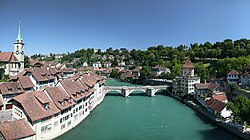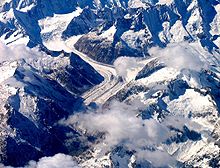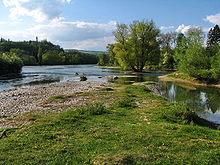Aare
| Aare Aar | |
|---|---|
 The Aare at Bern | |
 Drainage basin of the Aare | |
 | |
| Location | |
| Country | Switzerland |
| Cantons | Bern, Solothurn, Aargau |
| Settlements | Meiringen (BE), Interlaken (BE), Thun (BE), Münsingen, Muri bei Bern, Bern, Bremgarten bei Bern, Aarberg (BE), Büren a.A. (BE), Solothurn (SO), Aarwangen (BE), Aarburg (BE), Olten (SO), Niedergösgen (SO), Schönenwerd (SO), Aarau (AG), Wildegg (AG), Brugg (AG), Windisch (AG), Döttingen (AG), Klingnau (AG) |
| Physical characteristics | |
| Source | |
| • location | Unteraar Glacier, Bernese Oberland |
| • coordinates | 46°34′07″N 8°11′16″E / 46.56858°N 8.18774°E |
| • elevation | 1,940 m (6,360 ft) |
| Mouth | |
• location | Rhine below Koblenz, Switzerland |
• coordinates | 47°36′21″N 8°13′24″E / 47.6057°N 8.2234°E |
• elevation | 311 m (1,020 ft) |
| Length | 291.5 kilometres (181.1 mi) [1] |
| Basin size | 17,779 km2 (6,865 sq mi) |
| Discharge | |
| • location | Untersiggenthal |
| • average | 559 m3/s (19,700 cu ft/s) (MQ 1935-2013) |
| • minimum | 351 m3/s (12,400 cu ft/s) (MNQ 1935-2013), 138 m3/s (4,900 cu ft/s) (NNQ, 1963) |
| • maximum | 735 m3/s (26,000 cu ft/s) (MHQ 1935-2013), 2,656 m3/s (93,800 cu ft/s) (HHQ, 2007) |
| Basin features | |
| Progression | Rhine→ North Sea |
| Tributaries | |
| • left | Lütschine (Lake Brienz), Kander (Lake Thun), Gürbe, Saane/La Sarine, Zihl/La Thielle (Lakes of Neuchatel and Bienne), La Suze (Lake of Bienne), Dünnern |
| • right | Gadmerwasser, Zulg, Emme, Murg, Wigger, Suhre, Aabach, Reuss, Limmat, Surb |
| Waterbodies | Oberaarsee, Grimselsee, Räterichsbodensee, Lake Brienz, Lake Thun, Wohlensee, Lake Biel, Stausee Niederried, Klingnauer Stausee |
The Aare (Swiss Standard German: [ˈaːrɛ] ⓘ) or Aar (Swiss Standard German: [aːr] ⓘ) is the main tributary of the High Rhine (its discharge even exceeds that of the latter at their confluence)[2] and the longest river that both rises and ends entirely within Switzerland.[3][4]
Its total length from its source to its junction with the Rhine comprises about 295 kilometres (183 mi),[3][5] during which distance it descends 1,565 m (5,135 ft), draining an area of 17,779 km2 (6,865 sq mi), almost entirely within Switzerland, and accounting for close to half the area of the country, including all of Central Switzerland.[5]
There are more than 40 hydroelectric plants along the course of the Aare.[6]
The river's name dates to at least the La Tène period, and it is attested as Nantaror "Aare valley" in the Berne zinc tablet.
The name was Latinized as Arula/Arola/Araris.[7][nb 1]
Course
[edit]


The Aare rises in the great Aargletschers (Aare Glaciers) of the Bernese Alps, in the canton of Bern and west of the Grimsel Pass.[3] The Finsteraargletscher and Lauteraargletscher come together to form the Unteraargletscher (Lower Aar Glacier), which is the main source of water for the Grimselsee (Lake of Grimsel).[4][6] The Oberaargletscher (Upper Aar Glacier) feeds the Oberaarsee, which also flows into the Grimselsee.[4] The Aare leaves the Grimselsee just to the east to the Grimsel Hospiz, below the Grimsel Pass, and then flows northwest through the Haslital, forming on the way the magnificent Handegg Waterfall, 46 m (151 ft), past Guttannen.
Right after Innertkirchen it is joined by its first major tributary, the Gamderwasser. Less than 1 kilometre (0.62 mi) later the river carves through a limestone ridge in the Aare Gorge (German: Aareschlucht).[3] It is here that the Aare proves itself to be more than just a river, as it attracts thousands of tourists annually to the causeways through the gorge.[4] A little past Meiringen, near Brienz, the river expands into Lake Brienz. Near the west end of the lake it indirectly receives its first important tributary, the Lütschine, by the Lake of Brienz. It then runs across the swampy plain of the Bödeli (Swiss German diminutive for ground) between Interlaken and Unterseen before flowing into Lake Thun.[3]
Near the west end of Lake Thun, the river indirectly receives the waters of the Kander, which has just been joined by the Simme, by the Lake of Thun. Lake Thun marks the head of navigation.[6] On flowing out of the lake it passes through Thun, and then flows through the city of Bern, passing beneath eighteen bridges and around the steeply-flanked peninsula on which the Old City is located. To the south of the Old City peninsula is the Mattenschwelle, a weir which provides water for the small Matte hydroelectric power plant. River swimming in the Aare is popular in Bern, and the river is sometimes full of bathers on summer days. The river soon changes its northwesterly flow for a due westerly direction, but after receiving the Saane or La Sarine it turns north until it nears Aarberg. There, in one of the major Swiss engineering feats of the 19th century, the Jura water correction, the river, which had previously rendered the countryside north of Bern a swampland through frequent flooding, was diverted by the Aare-Hagneck Canal into the Lac de Bienne. From the upper end of the lake, at Nidau, the river issues through the Nidau-Büren Canal, also called the Aare Canal,[4] and then runs east to Büren. The lake absorbs huge amounts of eroded gravel and snowmelt that the river brings from the Alps, and the former swamps have become fruitful plains: they are known as the "vegetable garden of Switzerland".
From here the Aare flows northeast for a long distance, past the ambassador town Solothurn[3] (below which the Grosse Emme flows in on the right), Aarburg (where it is joined by the Wigger), Olten, Aarau,[3] near which is the junction with the Suhre, and Wildegg, where the Seetal Aabach falls in on the right. A short distance further, below Brugg, it receives first the Reuss, its major tributary, and shortly afterwards the Limmat, its second strongest tributary. It now turns due north, and soon becomes itself a tributary of the Rhine, which it even surpasses in volume when the two rivers unite downstream from Koblenz (Switzerland), opposite Waldshut in Germany. The Rhine, in turn, empties into the North Sea after crossing into the Netherlands.
Tributaries
[edit]



- Limmat (after and northeast of Brugg, and northwest of Baden)
- Reppisch
- Sihl
- Lake Zurich
- Jona
- Wägitaler Aa
- Linthkanal
- Lake Walen
- Linth
- Löntsch
- Sernf
- Flätschbach
- Seez
- Seerenbach
- Linth
- Lake Walen
- Reuss (after and northeast of Brugg, and northwest of Baden)
- Lorze
- Kleine Emme
- Lake Lucerne
- Schächen
- Chärstelenbach
- Göschener Reuss
- Aabach (coming from Seetal, in Wildegg)
- Bünz
- Suhre (after and north of Aarau)
- Aabach (from the left in Aarau)
- Stegbach
- Dünnern (in Olten)
- Wigger (right before Aarburg)
- Murg (before, west of Murgenthal)
- Rot (Roggwil)
- Langete (Langenthal)
- Ursenbach (Kleindietwil)
- Rotbach (Huttwil)
- (Grosse) Emme (after, east of Solothurn)
- Lake of Bienne
- La Suze (in Biel/Bienne, right next to the outflow)
- Zihlkanal
- Lake of Neuchatel
- La Broye (flows through Lake Morat)
- Zihl/La Thielle
- L'Orbe
- Le Talent
- Lake of Neuchatel
- Saane/La Sarine (after, west of Wohlensee)
- Gürbe (in Muri bei Bern)
- Zulg (west of Steffisburg)
- Lake Thun
- Lake Brienz
- Lütschine (at the end of Lake Brienz, right next to the outflow)
- Gadmerwasser (right after, northwest of Innertkirchen)
Reservoirs
[edit]- Lake Grimsel,[9] 1,908 metres (6,260 ft)
- Lake Brienz,[9] 564 metres (1,850 ft)[10]
- Lake Thun,[9] 558 metres (1,831 ft)[10]
- Lake Wohlen,[11] 481 metres (1,578 ft)
- Niederriedsee,[11] 461 metres (1,512 ft)
- Lake Biel,[11] 429 metres (1,407 ft)
- Klingnauer Stausee, 318 metres (1,043 ft)
Incidents
[edit]On May 26, 2022, Indonesia West Java Governor Ridwan Kamil's eldest child, Emmeril Kahn Mumtadz,[12] was declared missing after being swept away by the river current. Chronologically, Eril was swimming in the river with his sister and friends.[13] When he wanted to rise to the surface, Eril was dragged by a fairly swift current of the river which had previously received help from his friend.[14] The search efforts involving the police search and rescue team, maritime police, fire department, and authority of the city of Bern.[12] One week after declared missing, Emmeril Kahn Mumtadz was declared dead in absentia at the age of 22.[15] Although on June 9, 2022, Eril's body was located.[16] The funeral procession of Emmeril “Eril” Kahn Mumtadz took place in the family's burial ground located in Cimaung, Bandung regency, West Java.[17] Soon after news about Eril's body brought back to his home, Indonesian netizens review bombed Aare River's Google listing, leaving negative comments and one-star ratings as if the waterway was fully to blame for the tragedy.[18]
See also
[edit]Notes
[edit]Footnotes
[edit]- ^ Geoserver of the Swiss Confederation
- ^ "High Rhine". ICPR – International Commission for the Protection of the Rhine. Retrieved 2024-06-15.
- ^ a b c d e f g Bridgwater & Aldrich 1968, p. 11
- ^ a b c d e Gresswell & Huxley 1965, p. 27
- ^ a b Hoiberg 2010, p. 4
- ^ a b c Cohen 1998, p. 1
- ^ Kristol et al. 2005, p. 73
- ^ Forbiger 1848, p. 126f
- ^ a b c Anon 1973, p. 74
- ^ a b Gresswell & Huxley 1965, p. 272
- ^ a b c Anon 1973, p. 70
- ^ a b "Family Declares Indonesian Governor's Son Who Drowned in Swiss River Dead".
- ^ "Indonesians mourn governor's son found dead in Swiss river". The Straits Times. 2022-06-13. ISSN 0585-3923. Retrieved 2024-08-30.
- ^ "Ridwan Kamil's Eldest Son Is Missing in Switzerland".
- ^ antaranews.com (2022-06-09). "Progress in search for governor's son, presumed drowned in Aare River". Antara News. Retrieved 2024-08-30.
- ^ Arkyasa, Mahinda (2022-06-09). "Ridwan Kamil's Son Found Dead in Aare River". Tempo. Retrieved 2024-08-30.
- ^ "Ridwan Kamil's drowned son laid to rest as Bandung mourns - Tue, June 14, 2022". The Jakarta Post. Retrieved 2024-08-30.
- ^ "Indonesians review bomb Swiss river where governor's son went missing". Retrieved 2024-08-30.
References
[edit]- Anon (1973). Atlas Routier et Touristique (in French). Paris, France: Bordas-Tirade.
- Bridgwater, W.; Aldrich, Beatrice, eds. (1968). "Aare". The Columbia-Viking Desk Encyclopedia (3rd ed.). New York, NY: Columbia University Press. ISBN 978-0670230709.
- Cohen, Saul B., ed. (1998). "Aare". The Columbia Gazetteer of the World. New York, NY: Columbia University Press. ISBN 0-231-11040-5.
- Forbiger, Albert (1848). Handbuch Der Alten Geographie. Vol. 3. Leipzig, Germany: Veriag von Gustav Mayer.
- Gresswell, R. Kay; Huxley, Anthony, eds. (1965). Standard Encyclopedia of the World's Rivers and Lakes. New York, NY: G. P. Putnam's Sons.
- Hoiberg, Dale H., ed. (2010). "Aare River". Encyclopædia Britannica (15th ed.). Chicago, IL: Encyclopædia Britannica, Inc. ISBN 978-0-85229-961-6.
- Kristol, Andres; Cattin, Florence; Meroni, Barbara; Schmid, Gabrielle, eds. (2005). "Aarau AG (Aarau)" [Encyclopedia of the Swiss municipality of LSG: Dictionnaire de toponymique scommunes Suisses DTS / Dizionario dei comuni toponomastico svizzeri DTS]. Lexikon der schweizerischen Gemeindenamen LSG: Dictionnaire toponymique de scommunes suisses DTS /Dizionario toponomastico dei comuni svizzeri DTS (in German) (1st ed.). Stuttgart, Germany: Huber Frauenfeld. ISBN 3-7193-1308-5.
External links
[edit]- The Aare Gorge (Aareschlucht)
 Texts on Wikisource:
Texts on Wikisource:
- . Encyclopædia Britannica. Vol. I (9th ed.). 1878. pp. 2–3.
- "Aar". The Nuttall Encyclopædia. 1907.
- "Aar". Encyclopædia Britannica. Vol. I (11th ed.). 1911. pp. 2–3.
- "Aar". Collier's New Encyclopedia. 1921.


